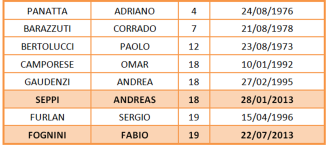Fun applies to everyone, not just for Federica Pellegrini. In fact, we are too often overly serious with ourselves, as if to do well it would be necessary to be concerned and totally focused. Instead, it is not uncommon for an athlete with this attitude put into a mental state in which he becomes too tense, living the event with an exaggerated apprehension . Conversely,an attitude stimulating mood states like the enthusiasm and the desire to have fun trigger positive feelings, mental energy and desire to maintain this state during the competition. Federica Pellegrini did it with success and I am convinced that many athletes should have to choose the same track, to find out that this attitude is a key that leads to be satisfied with ourself.
Monthly Archive for July, 2013
- More events lost than won – always fight
- Failure + Frustration are part of the game
- A lot of time to think: Boredom and worries
- 3 or 4 moments become critical in every competitions
- Control of performance processes not the results
- Athletes must be focus to win/perform/learn

“Dignity. Wonder if the meaning of this word will ever be able to make inroads in the sport of epo damned” (Eugenio Capodacqua) that the investigation of the French Senate Commission about the 1998 Tour de France has revealed and among which there are also Marco Pantani (winner of that edition) and Mario Cipollini. I suggest that there cannot be dignity without the presence of a certain degree of personal morality intensity, that can be described as follows:
“A further psychological dimension that has emerged as relevant to explain the unlawful conduct concerns the moral development, the ability to recognize an ethical dilemma and to deal with ethical situations. The intensity of individual morality affect the four phases of the moral decision cycle: the recognition of the existence of a moral problem, the moral judgment, the moral actions and act following these intentions. These phases interact well with the six dimensions that constitute the moral intensity:
- relevance of the results – refers to the sum of the benefits from having completed the actions;
- social consensus – refers to the extension of the acceptance regarding the ethic of the behaviors;
- the probability – refers to what percentage is considered conceivable that the consequences have a positive effect;
- temporal immediacy – is the amount of time that elapses between the end of the action and the beginning of the consequences;
- proximity – defines to what extent, who will use the impact may become identified as the beneficiary or victim;
- concentration effect – refers to the number of persons affected by the results obtained. “
Do you want to stop losing in court through no fault of your opponent,
but because you do not control your thoughts and your emotions?
All the secrets of mental training in tennis:
4 fundamental objectives to control your game by controlling your mind, your emotions and your thoughts.
In 12 years + manual online contest
Since few days Fabio Fognini is among the top 20 best tennis players and a few points off from 15th position. It’s an important result for the Italian men’s tennis because, along with Seppi, have achieved a success that was missing for 17 years as can be seen in the ranking below.

“Indoor air quality” refers to the quality of the air in a home, school, office, or other building environment. Most pollutants affecting indoor air quality come from sources inside buildings, although some originate outdoors. Typical pollutants of concern include combustion products such as carbon monoxide, particulate matter, and environmental tobacco smoke; substances of natural origin such as radon; biological agents such as molds; pesticides; lead; asbestos; ozone (from some air cleaners); and various volatile organic compounds from a variety of products and materials. Indoor concentrations of some pollutants have increased in recent decades due to such factors as energy-efficient building construction and increased use of synthetic building materials, furnishings, personal care products, pesticides, and household cleaners.
The potential impact of indoor air quality on human health nationally is considerable, for several reasons. Americans, on average, spend approximately 90 percent of their time indoors, where the concentrations of some pollutants are often 2 to 5 times higher than typical outdoor concentrations. Moreover, people who are often most susceptible to the adverse effects of pollution (e.g., the very young, older adults, people with cardiovascular or respiratory disease) tend to spend even more time indoors. Health effects that have been associated with indoor air pollutants include irritation of the eyes, nose, and throat; headaches, dizziness, and fatigue; respiratory diseases; heart disease; and cancer.
The great mountains never forgive, three alpinists Abel Alonso from Pontevedra, Álvaro Paredes of Valladolid and Xevi Gómez from Girona, were part of a larger, 11-person Spanish team scaling the mountain. According to the president of the Alpine Club of Pakistan, Manzoor Hussain, the climbers lost contact with the base camp at around 7,400 meters altitude. Expedition organizer, Javier Garrido, told Efe news agency: “The last contact with base camp was Monday morning. They told us they were having problems getting down because of the weather, above all the wind, and that they would have to seek shelter.” “The most likely explanation is that their satellite phones have run out of battery.”
Read more: http://www.digitaljournal.com/article/355140#ixzz2a47oBmco
Never think that your opponent is stronger, especially if it is true. It ‘s like driving with the parking brake pulled up a steep road. Would you do that?







